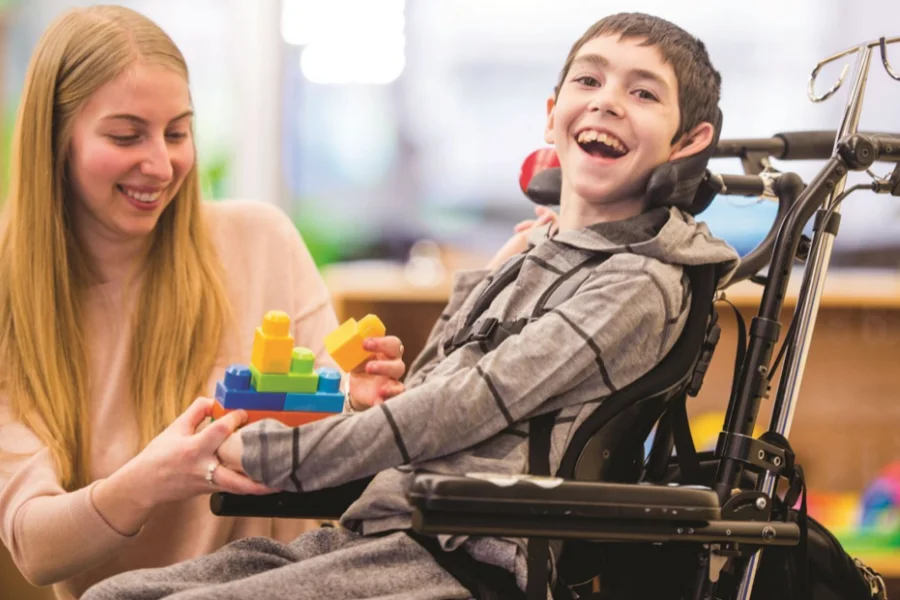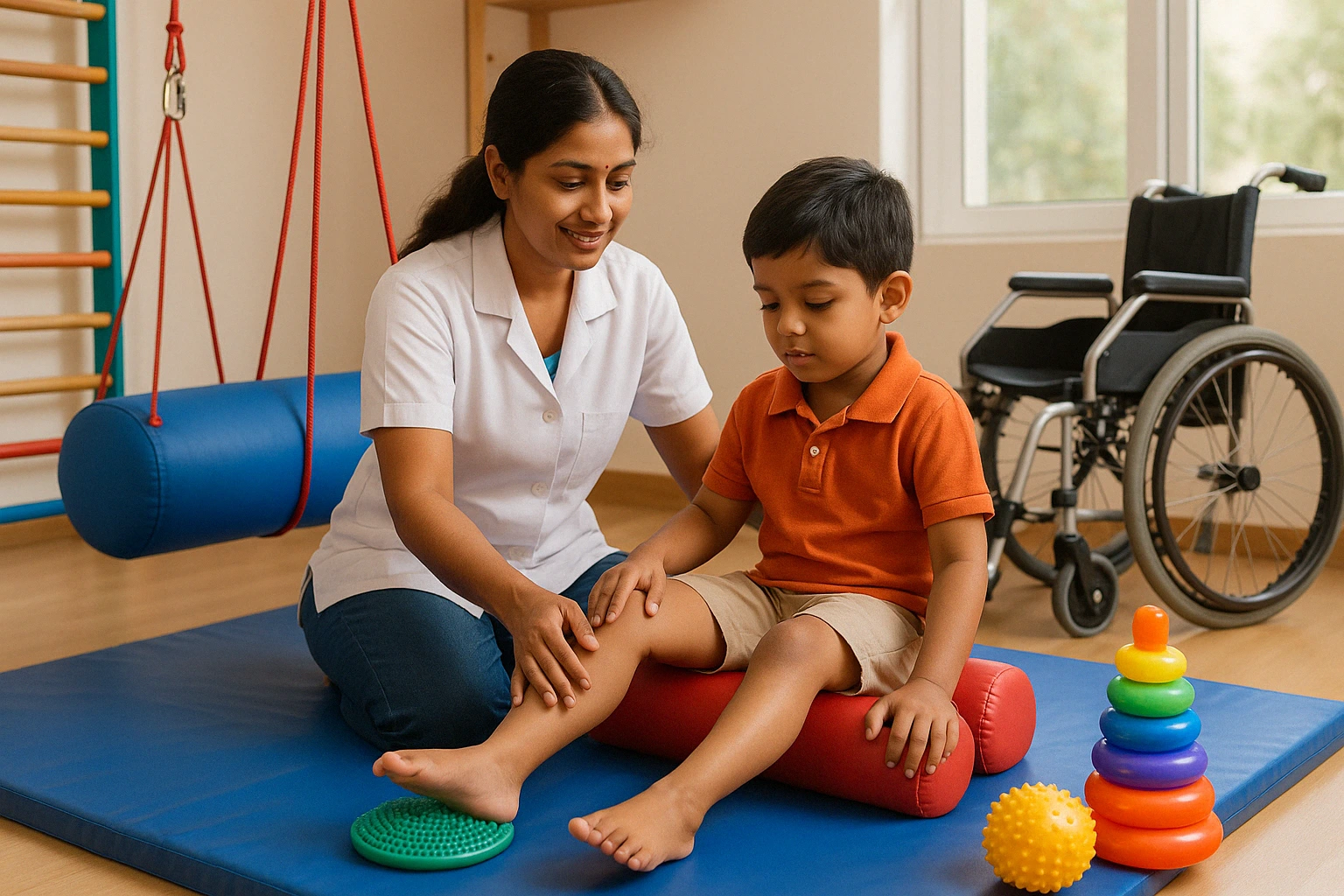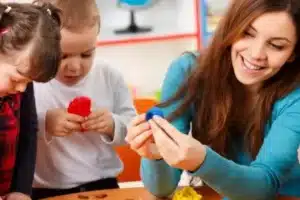
Source: dreamstime
Gross Motor Skills as the name suggests implies the different actions a child performs involving the larger muscles of his body including the arms, legs and the torso. Only when there is proper development of these muscles and with proper coordination the child can perform major functions of running, jumping, kicking and more functions. When the child reaches certain age levels, he is expected to master these Delayed Gross Motor Skills which helps him explore the world around him.
However, when the child shows consistent struggle while performing these tasks it can be a sign of concern hinting that there is a significant delay in achieving some major milestones.
This calls for higher assessment by specified professionals who can ascertain if the child needs extra support to develop strength and coordination.
Delayed Gross Motor Skills have a severe impact on the overall holistic progress of the child, as the most important skills that are required for daily functioning are poor. Understanding the reasons for delayed gross motor skills can be a boon for parents and caregivers who can then provide the child with the appropriate support and help to foster the child’s physical development.
For more details on the SEN Course Call/Whatsapp at +919321024137 / +919869866277
To download the brochure of the SEN Course, Click Here!
Which is a Red Flag for a Delay in Gross Motor Development?
A Red flag implies a cause of concern that implies that the child despite of reaching the desired age has not acquired essential skills that hampers his overall development. There are a set of defined Developmental Milestones formulated as per the age. So when a child doesn’t achieve these milestones it helps to identify the underlying issues and the child can be sent for further diagnostic assessment to rule out the possibility of any developmental delay.
Below is a more detailed breakdown of what to watch for at different stages:
Early Infancy (0–6 months)
- Persistent head lag beyond 4 months when lifted from a lying position
- Difficulty lifting or controlling the head in tummy time
- Not rolling from stomach to back or back to stomach by 5–6 months
- Not sitting with support for 6 months
Mid-Infancy (7–12 months)
- Not sitting unsupported for 7 months
- Lack of crawling or movement on belly/hands and knees by 9–10 months
- Not pulling up to stand or cruising along furniture by 12 months
- No attempts at taking independent steps by 15 months
Toddlerhood (18 months and beyond)
- Not walking independently by 18 months
- Difficulty walking across different types of surfaces by 18 months
- Not able to run for 2 years
- Not jumping by 30 months
- Not going up and down stairs independently by 30 months
Noticing the above symptoms can help to start the process of remediation sooner that prevents any further damage and ensures that the child gets the much-needed assistance.

What Disabilities Affect Gross Motor Skills?
Disabilities have a major impact on the overall growth of the child caused by Delayed Gross Motor Skills. Any disability results in sluggish growth pace which impacts the overall wellbeing of the child. As a disability slows down the entire progress process the child’s crucial abilities of sitting, standing, and walking can be hampered leading to severe consequences.
The prime conditions that are noted to affect the gross motor development are as follows:
Cerebral Palsy (CP)
This is a condition in which, before the child’s birth, the developing brain has been impacted that leading to a series of disorders hampering the child’s movement and coordination skills.
Muscular Dystrophy (MD)
As the name suggests, this disorder results in muscle mass reduction and muscle weakness, due to which the physical abilities are affected.
Dyspraxia:
Dyspraxia is a condition in which, due to faulty neural processing, the coordination skills needed for multitasking activities such as running, jumping, and climbing are impacted.
Down syndrome
Down Syndrome is a genetic disorder of chromosome 21 that leads to complications in the child’s balancing skills, gross motor milestones, and physical appearance are affected.
Autism (ASD)
Autism is again a neurological condition affecting the child’s coordination skills that leads to struggles in acquiring fine and gross motor skills.
Premature Birth
Prematurely born babies are at a higher risk of suffering from Delayed Gross Motor Skills as their early birth implies that their development is not fully complete, that can lead to lesser muscle development.
Traumatic Brain Harm
Any kind of major harm in the form of injury on the head during the early age period can lead to long-term issues of muscle development leading in poor motor skills.
The recognition of the above conditions at an Early Stage is very helpful to execute the required support therapies and approaches that can restrict the damage that has been caused already and help the child overcome the struggles caused by these conditions.
For more details on the SEN Course Call/Whatsapp at +919321024137 / +919869866277
To download the brochure of the SEN Course, Click Here!

Source: forbes
How do you Treat Motor Delays?
When a child does not attain a gross motor milestone at the expected age, it can be a motor delay that needs appropriate therapies, strategic plans to help children increase their strength level and movement skills. Treating motor delays will be based on the challenges faced by the child by determining which therapy works the best for the child as per his needs, age, and the challenges he is facing.
Here are common ways motor delays are treated:
Practical Hands-on Therapy
This treatment uses physical therapy that helps children to acquire strength, thereby assisting them in muscle building and enhancing coordination skills through easy, skillful movement activities.
Occupational Therapy
This therapy focuses on improving the skills that are needed for everyday functioning such as getting dressed, tying shoelaces and so on.
Early Intervention Programs
Toddlers in the age group of under 3 are offered therapy and developmental support in their community centers to assist them in achieving the age-appropriate milestones.
Home Exercises and Play-Based Activities
Therapists often recommend exercises and games that parents can do with their child at home to support progress in a fun and encouraging way.
Assistive Tools Devices:
Important tools such as walkers, braces and supportive seating are made available for children to move with caution and confidently.
Support by different professionals
Children who need higher help can get assistance from various professionals such as occupational therapists, speech consultants and pediatrician.
Parent-educator -Caregiver collaboration:
Positive networking and collaboration between Parents, educators and therapists helps to fasten the progress pace giving a big boost to the child’s overall holistic progress.
Offering children with the appropriate aid and assistance can be of great help in enabling them cope with the challenges of motor delay. This helps them to be independent and function with minimum assistance.
For more details on the SEN Course Call/Whatsapp at +919321024137 / +919869866277
To download the brochure of the SEN Course, Click Here!

How to Encourage Gross Motor Skills in Babies?
For any child to thrive and function independently in their surrounding it is imperative for him to achieve Delayed Gross Motor Skills. Gross motor skills including running, sitting and standing are the most basic and significant skills determine the child’s journey of life.
For these skills to develop parents can give them a lot of experiences, motivating them to go an extra mile to attain that skill.
So, it is necessary for parents to have the knowledge of the various milestones their child is needed to achieve at that age group that ensures that there is no cause of concern and the progress of the child is on track.
Listed below are some of the most important ways to stimulate the progress of gross motor skills in babies:
Tummy Time
Allow new-born to spend time on their stomachs when awake and observed. This strengthens the neck, back, and shoulders and supports early motions such as reaching and rolling.
Encourage Reaching and Grasping
Set toys just around baby and allow your baby to move around, roll, or crawl towards them.
Provide Floor Time
Give your kid lots of safe area to move about. Avoid spending a lot of time in bouncers, swings, or car seats during the day.
Support Sitting and Standing
Support your baby with cushions while they practice sitting. As they mature, let them to stand while leaning on objects that will strengthen their legs.
Engage them in appropriate toys
Use engaging and appropriate toys for children that stimulates their learning skills encouraging them to move around and be active.
Be their biggest cheerleader
Cheer your child for the smallest achievement and progress he makes that gives him the boost to perform better and try harder.
A Special Education Needs Course is the need of the hour as there are rising cases of children with several developmental delays. So, it is extremely important to be mindful of the signs to check out to identify any developmental delays.
Special Education Needs Course offered by Vidhyanidhi Education Society (Govt. Regd.) an eminent teacher training institute has been at the forefront producing skilled special educators who can take on the challenges of their diverse classrooms with great efficiency and confidence.
Join Vidhyanidhi Education Society’s SEN Course Today! Support Growth, Spark Potential, Transform Lives!
For more details on the SEN Course Call/Whatsapp at +919321024137 / +919869866277
To download the brochure of the SEN Course, Click Here!
FAQs
Is Developmental Delay Curable?
Some developmental delays can be improved with early intervention and therapy, although the results vary depending on the cause and level.
Are Developmental Delays Permanent?
Not always. Many children make great improvement with early treatment, but certain delays caused by deeper problems might last a long period.
Who is at Risk of Developmental Delay?
Children who are born at an premature age , or with genetic disorders and early physical injuries are at a greater risk of developmental delays but can be managed with guidance under a Special Ed Program at VES.



